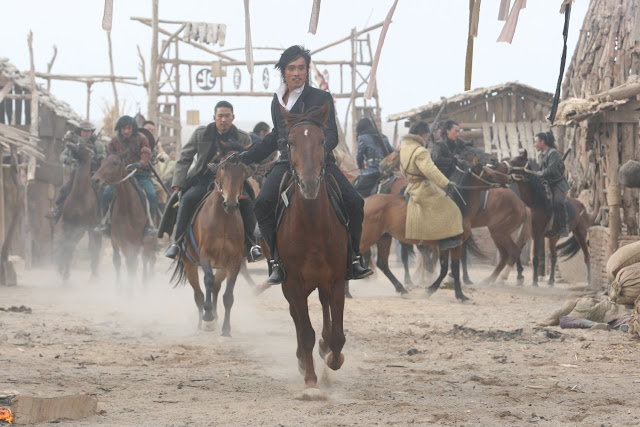Every so often, it's fun to throw caution to the wind and just watch something you've got absolutely no prior knowledge of. Sometimes you end up with something mediocre, like Moonwalkers. Sometimes you end up with something mind-numbingly awful, like Killer Mountain. However, every once in a while, you'll find something that's just a load of fun. A film that is not only entertaining, but memorable in a distinct kind of way. Such is the case with director Kim Jee-woon's The Good, The Bad, The Weird.
Set in 1930's Manchuria, the plot begins as so many westerns do; with a train robbery. A hitman by the name of Park Chang-yi (Lee Byung-hun, "The Bad") has been hired to intercept a treasure map from a Japanese banking official. Unbeknownst to him and his gang, a bandit named Yoon Tae-goo (Song Kang-ho, "The Weird") happens to be robbing the train at the same time. Escaping in the fray with a bundle of pilfered riches (including the map), Tae-goo attracts the attention of Park Do-won (Jung Woo-sung, "The Good"), an Eastwood-esque bounty hunter who happened to be tracking down Chang-yi when the whole thing went down. What started as a simple robbery explodes into an all-out race through the Manchurian desert as Tae-goo tries to find his treasure, Chang-yi tries to find Tae-goo, Do-won tries to find Chang-yi, and the Japanese army tries to find the map.
The first thing I have to praise here is the soundtrack. The score (composed by Dalparan and Jang Young-gyu) manages to mix a classic spaghetti western sound, reminiscent of Ennio Morricone, with a distinctly modern spin. The blaring trumpets and catchy, thumping beats punctuate the action in a way that could only be described as sublime. I make no exaggeration when I say that this has become one of my new favorite film scores of all time; aside from the odd title theme here and there, modern action scores are rarely anything special, yet here's a film that ditches the booming orchestral score for something much more eccentric and energetic that makes the film that much stronger as a whole.
Given how strong the score is, it would be a crying shame if the action and cinematography were mediocre by comparison. Thankfully that's not the case here. Despite the film costing a meager $10 million US to make (for comparison, Django Unchained and the upcoming Magnificent Seven remake both boast budgets that are literally ten times that amount), it's packed to the gills with fantastically shot action setpieces and stuntwork. The film is reminiscent of the Indiana Jones series in some respects, seamlessly merging badass, bloody violence with mild comedy, all while incorporating physical sets and thrilling chase scenes. While the gunplay and fisticuffs may prove exhausting to some, I found myself grinning like a madman at each intricate confrontation; this is a film that shows the true worth of action that is well-shot, well-choreographed, and above all, organic.
That said, there are gaps in between the bombastic fight scenes in which the film's pacing can slow to a crawl. While all of our main characters are charismatic and interesting in their own, unique ways, I felt myself growing anxious from time to time, eager to see guns drawn and blood spilled. The story can become a bit muddled and hard to follow at times, though I feel this may simply be the penalty that so many foreign films must face when confronted with a foreign audience. Though the film is very clearly ripe with homage to the spaghetti westerns of the past (Variety's Derek Elley described the film using the delightful phrase, "kimchi western"), it occasionally toes the line of being derivative. The climax, as well as the characterization of our three main characters, are ripped straight from Sergio Leone's Dollars trilogy; the film is definitely engaging on its own, but it's totally transparent to see where the filmmakers' inspiration was lifted from. Then again, A Fistfull of Dollars was clearly inspired by Akira Kurosawa's Yojimbo (to the point that Toho was able to successfully take Leone to court over the matter), so it can easily be said that homage is an often essential part of making great narrative art.
The Good,The Bad, The Weird is just a righteous good time. Although it can drag somewhat at times, the strong action and endearing characters more than make up for any of its faults. Sometimes it's fun to go with a wildcard and watch something completely outside of one's comfort zone. Often there's no better source for such movies than in the realm of foreign cinema. As I've proven with The Good, The Bad, The Weird, there's a good chance you might just stumble upon a hidden gem you wouldn't have found otherwise. Definitely definitely give this one a watch.





No comments:
Post a Comment